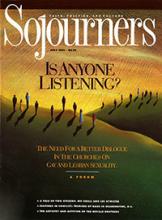I met her in church; she was reading Isaiah as if she expected the prophecies to be fulfilled in our hearing. The next week we went out for breakfast and discovered mutual tastes in food (home fries), poets (Henry Vaughan), and politicians (Mario Cuomo). Since then we have shared books, music, academic deadlines, and romantic crises. She turns up at my door to talk, and we commiserate about sleepless nights and slammed doors and long, angry silences over the phone.
In return for her faithfulness, I try to give her the steady, unblinking affection that few people in the church would accord her if they knew she is a lesbian. I am straight and I am married, but I am also a Catholic feminist, and so I know something about life at the margins. The sheep down at this end of the sheepfold sometimes have to fend for ourselves; we have learned to recognize each others' voices.
And yet, and yet. I read scripture, I read the spiritual Fathers, I read Aquinas, and the answer always comes out the same. Whatever else she may be called to, my friend is not called to a sexual partnership. The call from the beginning has always come to women and men.
God's creating will not only invites human beings to mirror in marriage God's own covenant faithfulness, but also makes them collaborators in the very act of creation. The most intensely private of pleasures is ordered by God to a radically public end: the incarnation of that first basic community we call family. To be united as one flesh, male and female engage in a mutual self-emptying, and in turn God exalts them, empowering them to conceive children -- God's image stamped anew on the world.
For those unable or unwilling to enter into heterosexual marriage, God has ordained a life of faithful abstinence. So scripture and tradition testify.
Read the Full Article

